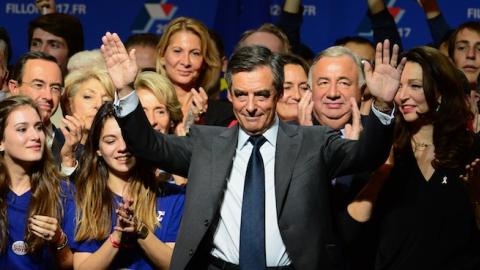European policy on Russia is beginning to crumble as the French presidential candidates step away from sanctions. The WSJ:
The two leading candidates, François Fillon and Marine Le Pen, are both avowed opponents of sanctions meant to punish Moscow for its annexation of part of Ukraine and its support for rebels in the country’s east.
Russia’s bombing of Syria’s onetime commercial capital of Aleppo—called a war crime by France’s current leaders—hasn’t deterred either politician from urging closer ties between Paris and Moscow.
The victory of either candidate in the May election threatens to blow a hole in Europe’s sanctions against Moscow, which are a centerpiece of the Continent’s strategy for containing Russia’s military assertiveness.
In post-Obama world, Germany could end up being isolated on Russia. The harshest, most effective attack on the Russia sanctions comes courtesy of Fillon, who said that it is not so much an actual policy intending to change Russian behavior as a symbolic gesture. Put even less diplomatically, it is a sham—a fake policy that allows Westerners to feel better about themselves while doing nothing serious about Russia’s attack on the post-1990 settlement in Eastern Europe.
This is a bigger deal than it may look. The past 25 years of world politics have rested on a series of polite fictions, agreed-upon conventions and hypocritical pretenses: That we had a policy to end the North Korean nuclear drive (ditto for Iran); That Europe was becoming a great posthistorical power based on the mighty engine of the euro; That the two-state solution was just a settlement freeze away; That international institutions and civil society were replacing national governments at the center of world politics; That immigration was a no-brainer; That the progress toward free trade was inexorable; That democracy was irresistibly on the march; and so on. Americans and Europeans believed that the world would look more and more like we wanted it to without us doing any heavy lifting.
Those are all very comforting ideas, but sadly none of them are true. In the next few years we are going to have to face some less pleasant choices based on hard truths rather than comfy illusions. Having the kind of world we really want—safe, prosperous, democratic—is not fully achievable no matter what we do. And having a tolerable world involves working harder, spending more, and putting more skin in the game than we want. A different kind of statesmanship, harder-edged and less sentimental, is going to be needed. Pretending to have a Russia policy will no longer be enough; we will have to choose between the unpalatable alternatives of effectively blocking Russian moves or acquiescing in Russian wins. Brutal clarity rather than liberal pink cloud thinking is the rising force in international affairs.
In the meantime, expect the old world and the old certainties to continue to crumble and fade.


















